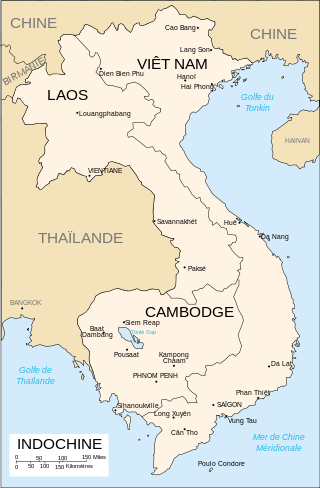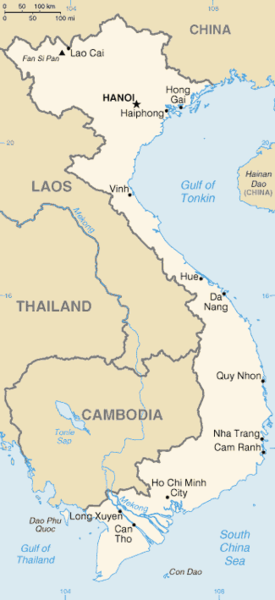
The International Rescue Committee (IRC) is a global humanitarian aid, relief, and development nongovernmental organization. Founded in 1933 as the International Relief Association, at the request of Albert Einstein, and changing its name in 1942 after amalgamating with the similar Emergency Rescue Committee, the IRC provides emergency aid and long-term assistance to refugees and those displaced by war, persecution, or natural disaster. The IRC is currently working in about 40 countries and 26 U.S. cities where it resettles refugees and helps them become self-sufficient. It focuses mainly on health, education, economic wellbeing, power, and safety.

The Montagnard Foundation, Inc. is a political organization whose mission is to protect the rights of the Montagnard/Degar peoples of Vietnam, who belong to over thirty indigenous ethnic groups in the Central Highlands. It is a non-profit organization, founded in 1990 and based in South Carolina in the United States designated as a Militant group by Vietnam. The Montagnard Foundation has spoken out against Vietnam's policies that affected the Montagnards. The organization was designated as a separatist group by the Vietnamese government.

Japan is a constitutional monarchy. The Human Rights Scores Dataverse ranked Japan somewhere in the middle among G7 countries on its human rights performance, below Germany and Canada and above the United Kingdom, France, Italy, and the United States. The Fragile States Index ranked Japan second last in the G7 after the United States on its "Human Rights and Rule of Law" sub-indicator.

The situation of human rights in Laos has often been, and remains, a recognized cause for serious concern. Laos is one of a handful of Marxist-Leninist governments and is ruled by a one-party communist government backed by the Lao People's Army in alliance with the Vietnam People's Army and the Socialist Republic of Vietnam in Hanoi.

The United States recognizes the right of asylum for individuals seeking protections from persecution, as specified by international and federal law. People who seek protection while outside the U.S. are termed refugees, while people who seek protection from inside the U.S. are termed asylum seekers. Those who are granted asylum are termed asylees.

The International Catholic Migration Commission (ICMC) is an international organization that serves and protects uprooted people, including migrants, refugees, and internally displaced people, regardless of faith, race, ethnicity or nationality. With staff and programs in over 40 countries, ICMC advocates for sustainable solutions and rights-based policies directly and through a worldwide network of 132 member organizations.

Blue Dragon Children's Foundation is a non-governmental organization based in Hanoi, Vietnam. The organization rescues children from crises including sex trafficking, forced labor, and slavery and then provides access to shelter, education and employment. More recently, Blue Dragon has been actively working to end human trafficking through a range of programs operating in Vietnam's most vulnerable communities.
According to the United States Department of State, "Thailand is a source, destination, and transit country for men, women, and children subjected to forced labour and sex trafficking." Thailand's relative prosperity attracts migrants from neighboring countries who flee conditions of poverty and, in the case of Burma, military repression. Significant illegal migration to Thailand presents traffickers with opportunities to coerce or defraud undocumented migrants into involuntary servitude or sexual exploitation. Police who investigated reaching high-profile authorities also received death threats in 2015.
Vietnam is primarily a source country for women and children trafficked for commercial sexual exploitation and forced labor. Women and children are trafficked to the People’s Republic of China (P.R.C), Cambodia, Thailand, the Republic of Korea, Malaysia, Taiwan, and Macau for sexual exploitation. Vietnamese women are trafficked to the P.R.C., Taiwan, and the Republic of Korea via fraudulent or misrepresented marriages for commercial exploitation or forced labor. Vietnam is also a source country for men and women who migrate willingly and legally for work in the construction, fishing, or manufacturing sectors in Malaysia, Taiwan, P.R.C., Thailand, and the Middle East but subsequently face conditions of forced labor or debt bondage. Vietnam is a destination country for Cambodian children trafficked to urban centers for forced labor or commercial sexual exploitation. Vietnam has an internal trafficking problem with women and children from rural areas trafficked to urban centers for commercial sexual exploitation and forced labor. Vietnam is increasingly a destination for child sex tourism, with perpetrators from Japan, the Republic of Korea, the P.R.C., Taiwan, the UK, Australia, Europe, and the U.S. In 2007, an Australian non-governmental organization (NGO) uncovered 80 cases of commercial sexual exploitation of children by foreign tourists in the Sa Pa tourist area of Vietnam alone.

Human trafficking is the trade of humans for the purpose of forced labour, sexual slavery, or commercial sexual exploitation.

The Indochina Migration and Refugee Assistance Act, passed on May 23, 1975, under President Gerald Ford, was a response to the Fall of Saigon and the end of the Vietnam War. Under this act, approximately 130,000 refugees from South Vietnam, Laos and Cambodia were allowed to enter the United States under a special status, and the act allotted special relocation aid and financial assistance.
The Hong Kong Special Administrative Region (HKSAR) of the People's Republic of China is a destination and transit territory for men and women trafficked for the purposes of commercial sexual exploitation and forced labor.
Jordan is a source, destination, and transit country for adults and children subjected to forced labor and, to a lesser extent, sex trafficking. Women from Southeast Asia and East Africa voluntarily migrate to Jordan for employment among the estimated 50,000 foreign domestic workers in the country; some domestic workers are subjected to forced labor. Many of these workers are unable to return to their home countries due to pending criminal charges against them or due to their inability to pay overstay penalties or plane fare home. Some migrant workers from Egypt—the largest source of foreign labor in Jordan—experience forced labor in the construction, service, and agricultural sectors. Syrians may face forced labor in the agricultural sector, while some refugee children are subjected to the worst forms of child labor. Men and women from throughout Asia migrate to work in factories in Jordan's garment industry where some workers experience forced labor. Jordan's sponsorship system places a significant amount of power in the hands of employers and recruitment agencies, preventing workers from switching employers or receiving adequate access to legal recourse in response to abuse. Some Sri Lankan women engaged in prostitution in the country may be trafficking victims.
Prostitution in Cambodia is illegal, but prevalent. A 2008 Cambodian Law on Suppression of Human Trafficking and Sexual Exploitation has proven controversial, with international concerns regarding human rights abuses resulting from it, such as outlined in the 2010 Human Rights Watch report.
Oman is a destination and transit country for men and women, primarily from India, Pakistan, Bangladesh, Sri Lanka, the Philippines, and Indonesia, some of whom are subjected to trafficking in persons, specifically conditions indicative of forced labor. Most of these South and Southeast Asian migrants travel willingly to Oman with the expectation of employment in domestic service or as low-skilled workers in the country's construction, agriculture, or service sectors. Some of them subsequently face conditions indicative of forced labor, such as the withholding of passports and other restrictions on movement, non-payment of wages, long working hours without food or rest, threats, and physical or sexual abuse. Labor recruitment agencies and their sub-agents in migrants’ original communities in South Asia, as well as labor brokers in the United Arab Emirates (UAE), Oman, and Iran, may deceive workers into accepting work that in some instances constitutes forced labor. Many of these agencies provide false contracts for employment either with fictitious employers or at fictitious wages, charge workers high recruitment fees at high rates of interest, and urge workers to enter Oman on tourist visas. Oman is also a destination and transit country for women from China, India, Morocco, Eastern Europe, and South Asia who may be forced into commercial sexual exploitation, generally by nationals of their own countries. Male Pakistani laborers, and others from India, Bangladesh, Sri Lanka, and East Asia, transit Oman en route to the UAE; some of these migrant workers are exploited in situations of forced labor upon reaching their destination.
Malaysia is a destination and a source and transit country for women and children subjected to trafficking in persons, specifically conditions of forced prostitution and for men, women, and children who are in conditions of forced labour.

The Indochina refugee crisis was the large outflow of people from the former French colonies of Indochina, comprising the countries of Vietnam, Cambodia, and Laos, after communist governments were established in 1975. Over the next 25 years and out of a total Indochinese population in 1975 of 56 million, more than 3 million people would undertake the dangerous journey to become refugees in other countries of Southeast Asia, Hong Kong, or China. According to the United Nations High Commissioner for Refugees, 250,000 Vietnamese refugees had perished at sea by July 1986. More than 2.5 million Indochinese were resettled, mostly in North America, Australia, and Europe. More than 525,000 were repatriated, either voluntarily or involuntarily, mainly from Cambodia.
Launched in 2014, Justice Centre Hong Kong is an independent, non-profit organisation that focuses on the protection of refugees and asylum seekers in Hong Kong. Hong Kong has long been a hub of migration and refuge due to wars in the region and Hong Kong’s historical role as a trading and transit entrepôt. There were estimated to be 14,000 refugees in the territory in 2017, and these refugees are in need of extensive legal assistance as the 0.8 substantiation rate is extremely low compared to rates of 25-62% per cent in other developed jurisdictions. Before early 2014 the organisation was known as the Hong Kong Refugee Advice Centre (HKRAC), which in 2007 had grown out of the Refugee Advice Unit from another local organisation working with refugees, Christian Action. And spun off by human rights lawyers Jennifer Stone and Raquel Amador, who were the first Directors. In 2012 Aleta Miller became Executive Director, helping HKRAC win the Clifford Chance Foundation Access to Justice Award in 2012, and relaunching the organisation as Justice Centre Hong Kong in 2014. From 2015 the Executive Director was Piya Muqit, who was previously head of policy and advocacy at UNICEF UK. In November 2020 Melanie McLaren was appointed Executive Director.
Sex trafficking in China is human trafficking for the purpose of sexual exploitation and slavery that occurs in the People's Republic of China. China, the world's second-most populous country, has the second highest number of human trafficking victims in the world. It is a country of origin, destination, and transit for sexually trafficked persons.

Sex trafficking in Vietnam is human trafficking for the purpose of sexual exploitation and slavery that occurs in the Socialist Republic of Vietnam. Vietnam is a source and, to a lesser extent, destination country for sexually trafficked persons.










